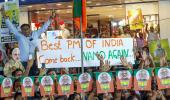The share of candidates who were successful among the BJP was 56.5% in 2019. It was 5% for the Congress.

The success rate of turncoat candidates, the people who contested elections on the ticket of parties different from the ones they had embraced earlier, has been declining over time.
Their strike rate was less than 15 per cent in recent elections compared to an average of nearly 30 per cent since the 1960s, shows an analysis of Lok Sabha numbers from Ashoka University's Trivedi Centre for Political Data.
This covers only those who were turncoats in national elections and excludes politicians who may have contested state elections under a different party.
The strike rate of turncoat politicians hit its peak of 68.9 per cent in the 1977 elections. It was at 14.9 per cent in 2019. The strike rate is the share of turncoat politicians who are successful in a given election.
The dataset identified 195 turncoat candidates across political parties in 2019. They accounted for 2.4 per cent of the over 8,000 candidates contesting elections. Only 29 of the turncoats won.
The share of successful turncoat candidates was significantly higher as late as 2004.
The number at that time was 26.2 per cent. Turncoats accounted for 3.9 per cent of the overall candidates in 2004.
The 1977 elections had seen a number of different political powers coming together, including members of the Congress (many of whom Indira Gandhi had jailed during the Emergency), socialists, Jana Sangh and farm leaders.
The highest share of turncoats in the candidate list was in 1980 when Indira Gandhi came back to power. Turncoats accounted for 377 or 8.1 per cent of the 4,629 candidates at the time.
This is higher than the 161 turncoats out of the 2,439 candidates (6.6 per cent) seen in 1977. The success rate was lower in 1980 at 20.69 per cent. It has been below 15 per cent for three elections in a row.
The Bharatiya Janata Party fought its first elections in 1984. A comparison with the Congress shows divergent trends since then.
The Congress fielded 32 turncoat candidates in 1984. Twenty-six of them won. This brought the strike rate of turncoat candidates to 81.3 per cent for the Congress in 1984.
The success was on the back of a wave favouring the Congress following Indira Gandhi's assasination which helped the party win over 400 seats.
Since the BJP was newly formed, a total of 62 candidates had previously fought under a different flag in earlier elections.
The BJP had a zero per cent success rate among them in 1984.
The numbers since then show a rising trend for the BJP and a decline for the Congress.
The share of candidates who were successful among the BJP was 56.5 per cent in 2019. It was 5 per cent for the Congress. Both the parties saw a decline in 2019 compared to 2014.
The BJP's turncoat candidates had a 66.7 per cent success rate in 2014. The figure was 5.3 per cent for the Congress. Turncoats accounted for 5.3 per cent of the total candidates in the BJP during 2019. For the Congress, it was 9.5 per cent.
Recent news reports suggest that the BJP is increasingly screening candidates before accepting them from other parties to ensure that they are able to deliver for the party.
Turncoats for the BJP and other parties are being seen in multiple states, including Uttar Pradesh and West Bengal.

Sitting MPs Who Have Switched Sides
Political parties are still in the process of announcing their candidates for the 2024 Lok Sabha polls, but there are already quite a few turncoat sitting MPs, either in the fray or hopping parties. The list comprises MPs in the 17th Lok Sabha.
Other than sitting MPs, there will be several former MPs in the fray who have switched parties recently.
The BJP has fielded Konda Vishveshwar Reddy, a former BRS MP (2014-2019), from Chevella in Telangana, and B Narsaiah Goud from Bhongir.
Goud was the BRS MP from Bhongir in 2014-2019. The BJP has fielded former BRS MP Goddam Nagesh from Adilabad, replacing its sitting MP Soyam Bapu Rao.

Brijendra Singh, the BJP MP from Haryana's Hisar, has joined the Congress.
Geeta Kora, a Congress MP, will contest Jharkhand's Singhbhum (ST) seat on a BJP ticket.
Rahul Kaswan, the BJP MP from Rajasthan's Churu, is now the Congress candidate from the seat.
Danish Ali, a suspended BSP MP from Amroha (UP), could contest on a Congress ticket.
Ritesh Pandey, who won as a BSP candidate in 2019, will contest the Ambedkar Nagar seat from the BJP.
Afzal Ansari, tje BSP MP from UP's Ghazipur, is now the Samajwadi Party's candidate.
The BJP has fielded BB Patil, who won the 2014 and 2019 Lok Sabha elections on a BRS ticket, from Telangana's Zahirabad.
BRS Peddapalli (Telangana) Lok Sabha MP Borlakunta Venkatesh Netha joined the Congress last month.
BRS Warangal (Telangana) MP Pasunuri Dayakar joined the Congress after the BRS denied him a ticket.
BRS Chevella (Telangana) MP G Ranjith Reddy has also joined the Congress.
Lalganj (Uttar Pradesh) BSP MP Sangeeta Azad has joined the BJP. The party has already announced its Lalganj candidate.
The BJP has fielded sitting Nagarkurnool (Telangana) BRS MP P Ramulu's son P Bharat.
Feature Presentation: Aslam Hunani/Rediff.com











